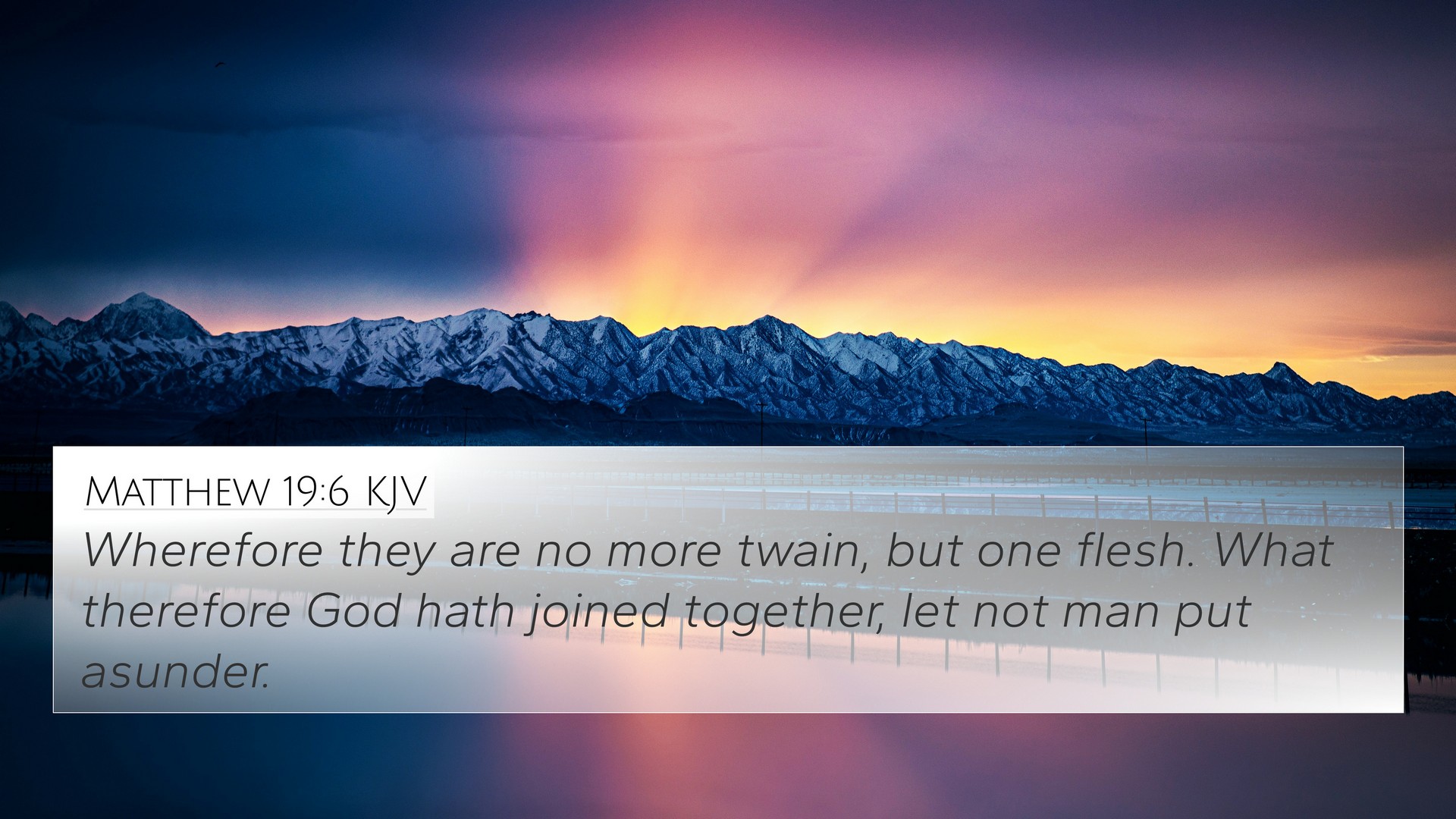Understanding Matthew 19:6
Matthew 19:6 states, "So they are no longer two, but one flesh. Therefore what God has joined together, let no man separate." This verse emphasizes the sanctity and unity of marriage, highlighting divine intention in the institution of marriage.
Summary of Meaning
This verse encapsulates a profound theological truth regarding marriage that has been expounded upon by various biblical commentators. Below are insights drawn from renowned public domain commentaries:
-
Matthew Henry:
He emphasizes that the phrase "one flesh" signifies that God has ordained a deep and spiritual union between a husband and wife, which transcends mere physical intimacy. Marriage is intended to be a lifelong commitment and should not be easily severed. Henry also indicates that this divine union is a reflection of God's covenant with His people.
-
Albert Barnes:
Barnes further elaborates on the permanence of this union, urging that once joined, the couple should remain united. He draws attention to the phrase "what God has joined together," underscoring that marriages are established by God’s authority and should be respected as such. Barnes interprets the verse as a divine command against divorce, reinforcing the sacred nature of marital bonds.
-
Adam Clarke:
Clarke discusses the historical context of marriage in Jewish culture, highlighting that this teaching from Jesus was revolutionary. He notes that the 'one flesh' concept implies a unity that reflects the relationship between Christ and the Church, promoting the idea that marriage should mirror this divine relationship in love and commitment.
Bible Verse Cross-References
To grasp the full doctrinal implications of Matthew 19:6, we can look at several related scriptures that reinforce its themes:
- Genesis 2:24: "Therefore shall a man leave his father and mother, and shall cleave unto his wife: and they shall be one flesh."
- Ephesians 5:31: "For this cause shall a man leave his father and mother, and shall be joined unto his wife, and they two shall be one flesh."
- Malachi 2:16: "For the Lord, the God of Israel, saith that he hateth putting away: for one covereth violence with his garment, saith the Lord of hosts: therefore take heed to your spirit, that ye deal not treacherously."
- 1 Corinthians 6:16: "What? know ye not that he which is joined to an harlot is one body? For two, saith he, shall be one flesh."
- Mark 10:8: "And they twain shall be one flesh: so then they are no more twain, but one flesh."
- Colossians 3:14: "And above all these things put on charity, which is the bond of perfectness."
- Romans 7:2: "For the woman which hath an husband is bound by the law to her husband so long as he liveth; but if the husband be dead, she is loosed from the law of her husband."
Inter-Biblical Dialogue
The connections between these verses and Matthew 19:6 reveal a theological continuity throughout the Scripture regarding marriage:
- Cross-referencing these verses reveals how the concept of "one flesh" serves as a cornerstone not only in the treatment of marital relationships but also in understanding the church's relationship with Christ.
- Thematic connections emphasize God's desire for unity, fidelity, and commitment in every relationship sanctioned by Him.
- Using tools for Bible cross-referencing, believers can see how concepts and principles regarding family and marriage are interwoven throughout both the Old and New Testaments.
- The inconsistency of human behavior in light of divine commands creates a dialogue on both the sacred and challenged nature of marriage, prompting discussions on grace, healing, and restoration.
Conclusion
Matthew 19:6 is a powerful reminder of the beauty and sanctity of the marital union as designed by God. The insights provided by the commentators deepen our understanding, while the cross-referenced texts reinforce and amplify this teaching. In modern application, these teachings can guide Christians in making marital decisions that honor God’s intention for partnership, love, and commitment.
In studying this verse and others like it, one will discover invaluable tools for biblical interpretation and cross-referencing that can enhance their understanding of both Scripture and Christian living.









